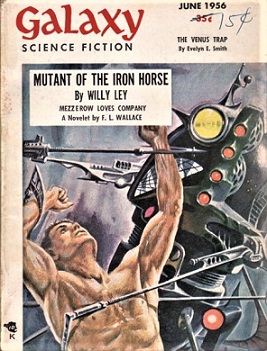
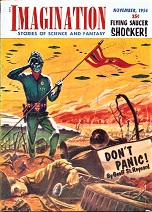 X Minus One (1955-58) aired Richard Maples’ short story “The Scapegoat” on August 8, 1957 as its 106th episode. Maples’ story originally appeared in the June 1956 issue of Galaxy (cover at left). Maples is an author with whom I am unfamiliar, but a quick search at the ISFDB notes that he published but two short stories, the other being “The Frightful Ones” which saw print in the November 1954 issue of Imagination (cover at right).
X Minus One (1955-58) aired Richard Maples’ short story “The Scapegoat” on August 8, 1957 as its 106th episode. Maples’ story originally appeared in the June 1956 issue of Galaxy (cover at left). Maples is an author with whom I am unfamiliar, but a quick search at the ISFDB notes that he published but two short stories, the other being “The Frightful Ones” which saw print in the November 1954 issue of Imagination (cover at right).
“The Scapegoat” poses a serious, timely, and ethical question. How do societies treat, or deal with, their outcasts, or outright criminals? Depending on the nature and severity of the offense, mild censure (as in fines), imprisonment, banishment from society through other means than imprisonment, or as a last resort capital punishment? Science fiction has tackled this subject in any number of stories over the years. Two that come immediately to mind are Damon Knight’s “The Country of the Kind” (The Magazine of Fantasy and Science Fiction, February 1956) and Terry Bisson’s “macs” (The Magazine of Fantasy and Science Fiction, October/November 1999) which went on to win the Nebula Award for Best Short Story. Both offer wildly opposing views on punishment, the latter even proposing an answer to the question of victims’ rights.
In “The Scapegoat” the problem is not apparent at first, for we are shown only a good samaritan, an average man and husband, coming to the aid of an old man beset by hoodlums. He takes the old man into his home to give aid and comfort for a short time, but it is the old man’s subsequent behavior that provides the springboard for what is to follow. The SF element comes into play down the road as we discover more and more about the old man–and it is then that the questions concerning punishment come fully into play, for there’s a revelation at just the right moment that opens our eyes to the true theme of the story, that when executed properly is one of the things SF does best when it wants to provide thoughtful social commentary (and thereby offers several interpretations of the title, one of which would turn it into a question).
Play Time: 21:22
{The final month of summer vacation found our intrepid and tanned future astronauts at the corner drugstore perusing their favorite magazines, all of which began appearing in the 1950s. Fantastic Universe enjoyed a healthy run of 7 years, from 1953-1960. In 1957 it was a bi-monthly. If, Worlds of Science Fiction became, through a sale from one owner to another, a defacto younger sister to Galaxy. It had a phenomenal run of over 20 years, from 1952-1974. It reached its heyday in the late 1960s when editor Fred Pohl won three back to back Hugo awards (1966-68) for If as Best Magazine, after which Pohl would step down to return to his writing. In 1957 If was a bi-monthly. Super-Science Fiction had a short run as a bi-monthly, publishing only 18 issues between December 1956 and October 1958.}
[Left: Fantastic Universe, August 1957 – Center: If, August 1957 – Right: Super-Science Fiction, August 1957]
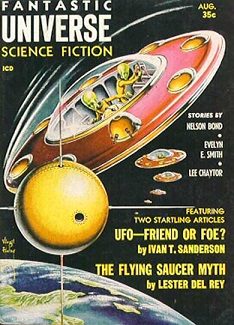
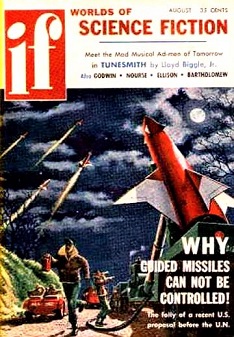
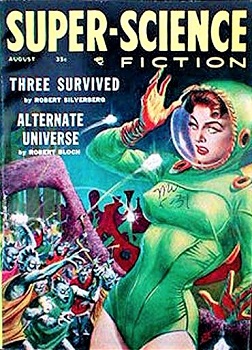
To view the entire list of weekly Old Time Radio episodes at Tangent Online, click here.